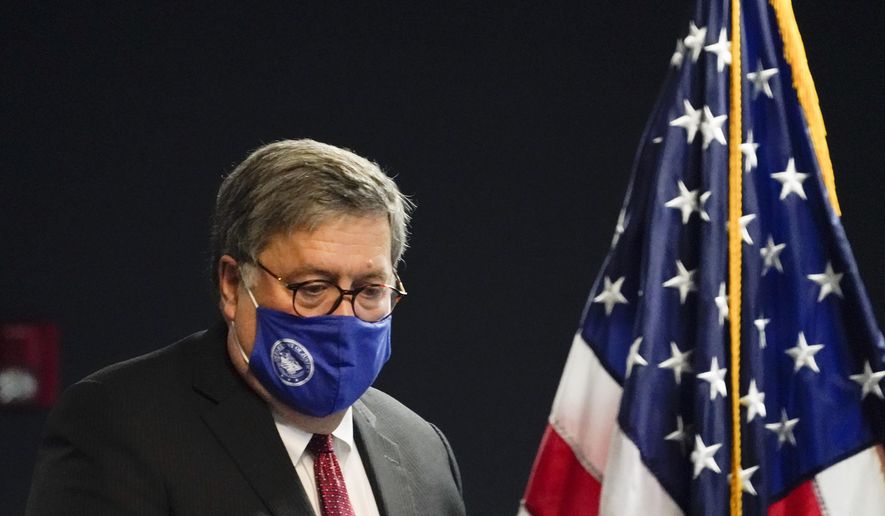Attorney General William P. Barr on Wednesday railed against “militant secularists” who he said are eroding the nation’s moral standards and disrupting the founders’ vision of government, liberty and power.
In an address to the National Catholic Prayer Breakfast, he called religion the “foundation of a free society” but said it has been “under siege by secularists” who have undermined religion and tried to replace it with a morality hostile to faith.
“The consequences of this hollowing-out of religion have been predictably dire,” Mr. Barr said at the National Catholic Prayer Breakfast. “Over the past 50 years, we have seen striking increases in urban violence, drug abuse and broken families. Problems like these have fed the rise of an ever-more powerful central government.”
Mr. Barr, a Catholic, has sounded that theme repeatedly and has increasingly put the power of the Justice Department behind it. During the COVID-19 pandemic, he has deployed U.S. attorneys to demand that houses of worship be treated at least as well as businesses or racial justice protesters.
He received the prayer breakfast’s Christifideles Laici Award for “fidelity to the church, exemplary selfless and steadfast service in the Lord’s vineyard” and other work.
His stances, however, also have drawn fierce opposition within and outside the Catholic Church.
“We consider Mr. Barr’s recent decisions in actions to be abhorrent in the context of the Catholic faith,” the Association of Catholic Priests said in a statement. “We consider especially scandalous his decision to begin again federal executions after 17 years of a moratorium.”
Other Catholic groups complained that Mr. Barr was a poor choice after he oversaw the clearing of anti-Trump protesters from near the White House in June, in an incident that is under investigation by multiple inspectors general.
But Leonard Leo, president of the National Catholic Prayer Breakfast’s board and co-chairman of the Federalist Society, a conservative legal group, said Mr. Barr is “a Catholic public servant” and “a man of courage.”
“His faith informs the attributes of his public service: integrity, honesty, humility, and sincere and wise counsel,” Mr. Leo said.
Mr. Barr has given a series of high-profile speeches over the past year. At an event hosted by Hillsdale College this month, he said the power of the attorney general is to decide which cases get prosecuted and how.
Last year, he raised his concerns about anti-religious sentiment in a speech at the University of Notre Dame, exploring the historical role of religion in the American political experiment.
That speech fueled a feverish debate that Mr. Barr rejoined Wednesday.
He argued that the kind of self-governance at the heart of the American republican system requires self-restraint, “and there is no greater teacher of self-restraint than religion.”
It builds community and reinforces the common good as a goal, he said. That link, he said, is often forgotten or ignored.
He admonished those who invoke the “separation of church and state” — a line from a letter written by Thomas Jefferson, which does not appear in the founding documents — as a precept of governance. He said the meaning is misunderstood.
“Separation of church and state did not mean, and never did mean, separation of church and civics,” he said.
Mr. Barr said he is witnessing “small but significant steps” toward the restoration of religion to its proper role in America and pointed to a trio of Supreme Court cases.
In one, the justices allowed employers to receive religious and moral exemptions to a federal mandate that they provide health insurance that includes free contraception.
In the second case, the high court protected religious schools from employment discrimination lawsuits.
Justices in a third case struck down a provision in the Montana Constitution that exempted religious schools from a scholarship program for underprivileged students.
“In a sense, it is dispiriting that the disputes in these cases ever arose,” he said. “In each case, the religious litigants were not asking for anything more than their basic freedom to exercise their faith.
“Nevertheless, the recognition of those rights by the courts is encouraging,” he said.
Mr. Barr delivered his speech as President Trump,and Democratic presidential nominee Joseph R. Biden, also a Catholic, sparred for Catholic voters.
Catholics have been a key voting bloc in presidential elections but have supported both Republicans and Democrats. However, they have backed the winner in nearly every recent election.
• Jeff Mordock can be reached at jmordock@washingtontimes.com.




Please read our comment policy before commenting.